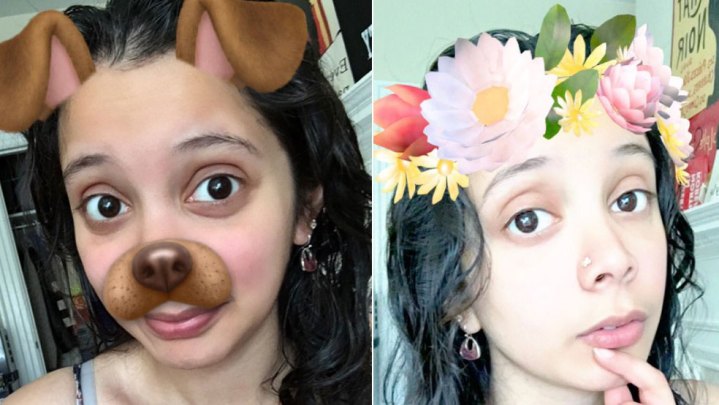
(first reaction to new snapchat filter from me and friend)
"whitewash much????" pic.twitter.com/bSK2yQFqP3— panda (@pandaprince_ss) March 9, 2016
For Coachella, Snapchat debuted a flower crown filter that does indeed whitewash the entire photo or video in question, but Snapchatters are also taking issue with “beautify,” a filter that makes the skin lighter, the face slimmer, the eyes wider, and blemishes disappear. When one Yahoo beauty editor tried out the filter for herself, she noted, “The filter gave her a significantly lighter complexion, a more narrow jaw and nose, and even turned her brown eyes nearly blue.” But the effects were a bit less noticeable on a colleague, who said that her own “change was fairly subtle. The filter evened out her skin tone and added pink and yellow hues to her complexion.”
why does every snapchat filter try to make me look white?
— tyra banksy (@meganamen) May 15, 2016
All the same, some users seem none too pleased by the fact that Snapchat is imposing a pretty standardized definition of being “pretty” or “attaining beauty.”
but why do the snapchat "beautifying" filters make your skin whiter and eyes lighter
— mom streeter (@ccstreeter) May 10, 2016
But others have been much more forgiving of the photo- and video-sharing app, comparing many of the filters to those used by Instagram or other editing tools to simply smooth over imperfections and enhance photographs. Really, some users say, the filters are practically like using your camera’s flash, as it doesn’t only affect your skin, but really the entirety of the photograph.
idk why snapchat filters whitewash so much but im having fun pic.twitter.com/fIUdHI6G1M
— Pleiades (@oracleofvenus) April 23, 2016
Snapchat has yet to respond to the latest outcry over its features, but it should be noted that it’s not the only company to produce a filter that purports to “beautify” your photos by way of lightening them. Last year, Xiaomi also came under fire for a “beautify” feature on a smartphone camera that was effectively a skin-lightening tool.
Editors' Recommendations
- Snapchat hopes its new AI selfie feature will be a moneymaker
- Snapchat may owe you money just for using filters — here’s how to get paid
- Snapchat Plus subscribers are getting these four new features today
- Having trouble logging in? Snapchat is working on a fix
- Snapchat’s pocket-sized Pixy drone takes to the skies


